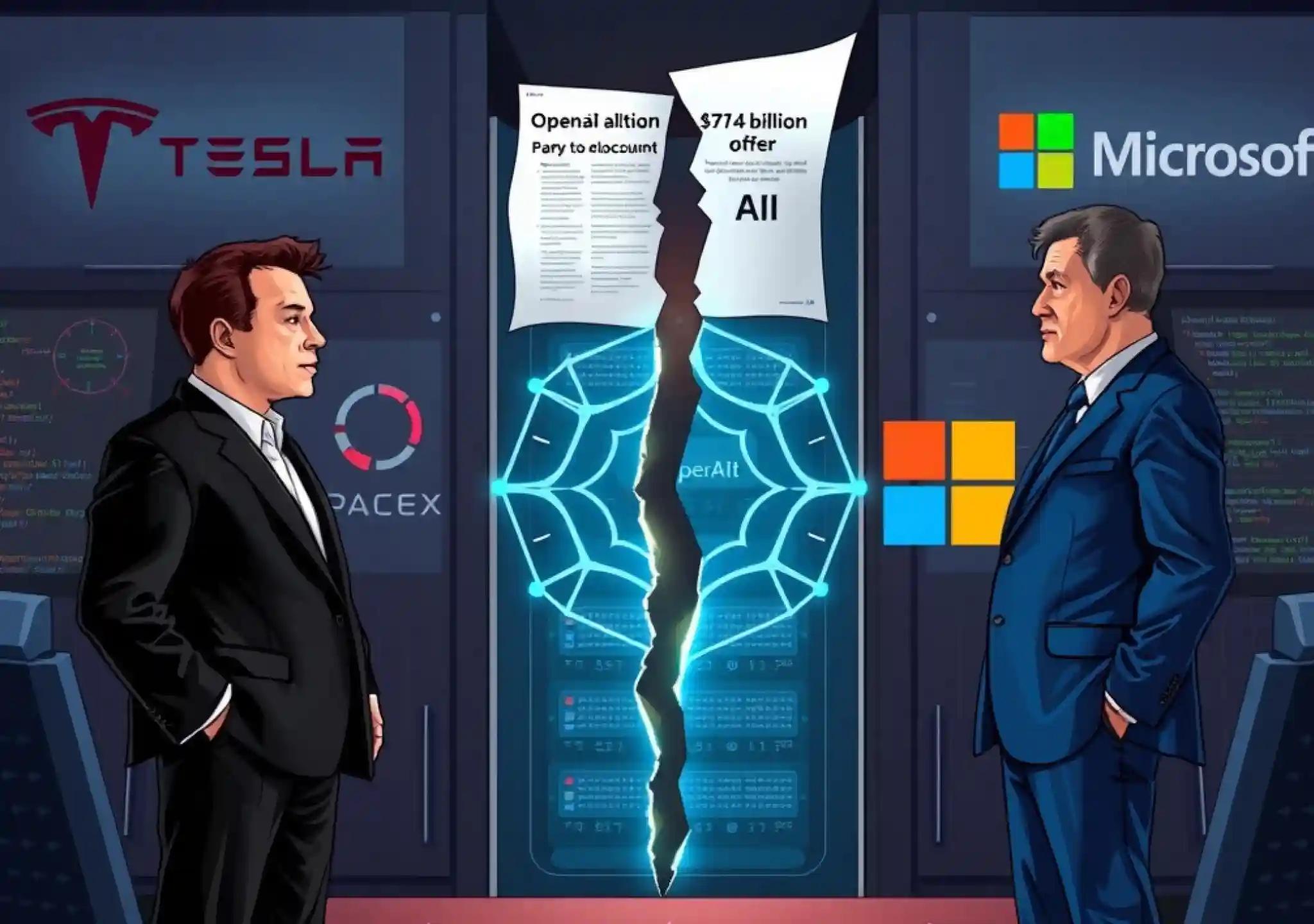Two of Silicon Valley’s most influential tech leaders are embroiled in a very public clash over the future direction of OpenAI, the developer of ChatGPT.
A Clash of Titans Over the Future of OpenAI
Elon Musk and his former associate Sam Altman, two of the most high-profile names in the tech world, are engaged in an escalating conflict concerning OpenAI, the AI company behind ChatGPT.
Musk – the billionaire CEO of Tesla and SpaceX – has taken legal action in recent months in an attempt to prevent Altman from transitioning OpenAI from its nonprofit origins into a for-profit entity.
This week, Musk intensified the feud by proposing a $97.4 billion buyout of OpenAI’s nonprofit arm, aiming to preserve its founding mission: to ensure “artificial general intelligence benefits all of humanity.”
Altman rejected Musk’s offer.
Shortly after, Musk’s legal team stated that he would drop the acquisition bid if OpenAI agreed to remain a nonprofit, although doing so would cut off access to large-scale investment.
Meanwhile, the two tech leaders have traded personal insults both in public statements and in court.
How did this partnership turn into a rivalry?
OpenAI’s Perspective on the Feud
The dispute dates back to the early days of OpenAI.
Musk, 53, and Altman, 39, were among the original co-founders of the company in 2015 and served as its initial co-chairs.
Back then, Musk was already a high-profile figure due to his leadership at Tesla and SpaceX.
OpenAI launched as a nonprofit organization dedicated to research and safety rather than profits.
According to OpenAI’s internal communications, friction began around 2017 when the team realized it would require extensive computing resources and significant funding to pursue artificial general intelligence (AGI).
OpenAI claims that Musk suggested converting the organization into a for-profit company with himself as CEO. When his plan wasn’t adopted, he allegedly withheld further funding.
Musk formally exited OpenAI in 2018 but initially continued to support its work. Later, he acquired Twitter in 2022 and launched his own AI venture, xAI, in 2023.
OpenAI then evolved. In 2019, it formed a for-profit subsidiary to attract capital, effectively creating a hybrid structure.
By 2022, OpenAI – and Altman – rose to global fame with the release of ChatGPT.
Musk’s View of the Dispute
Tensions resurfaced in 2023 when Microsoft announced a $10 billion investment in OpenAI, supplementing its previous $3 billion contributions.
While Musk declined Al Jazeera’s request for comment, his opinions are well documented in court records.
In a lawsuit filed last year, Musk accused OpenAI of becoming an extension of Microsoft, describing the situation as a “Shakespearean” betrayal, aimed at enriching Altman through generative AI.
Interestingly, some of Musk’s criticisms echoed those raised by U.S. and European regulators, who launched antitrust probes into the Microsoft-OpenAI alliance.
In November, Musk expanded his complaint, accusing the two companies of cornering the generative AI market.
He also claimed Altman urged investors to avoid funding Musk’s rival firm xAI and demanded that OpenAI and Microsoft cut ties to preserve the nonprofit’s original goals.
The Verbal Crossfire Between Musk and Altman
The rivalry has gone beyond the courtroom. Both men have taken public swipes at each other.
Earlier this week, Altman mocked Musk’s offer on X by saying, “No thank you but we will buy twitter for $9.74 billion if you want.”
Musk quickly fired back: “Swindler.”
In a televised interview, Altman questioned Musk’s motives, suggesting they stem from personal insecurities rather than genuine concern about AI’s future.
“I think he wants to slow us down so he can catch up with xAI,” Altman told Bloomberg TV during the Paris AI Action Summit.
“He’s driven by his own issues … but who really knows,” Altman added.
Musk, on the other hand, has labeled Altman in legal filings as a dishonest figure, accusing him of manipulating OpenAI’s trajectory for personal gain.
Musk’s attorneys described OpenAI under Altman as a “long con” and a “case study in altruism being overtaken by greed.”
They alleged that Altman and his colleagues misled Musk, leveraging his fear of AI risks to secure his early support.
Why OpenAI Is Pushing to Become a For-Profit
Altman and OpenAI’s board argue that the company must restructure to secure major funding from SoftBank, which has reportedly valued OpenAI at $260 billion.
While transitioning from nonprofit to for-profit isn’t unusual – especially in industries like healthcare – the scale of OpenAI’s ambitions is unprecedented, said Rose Chan Loui of the Lowell Milken Center on Philanthropy and Nonprofits.
OpenAI plans to have its new for-profit arm compensate the nonprofit for its assets, effectively spinning off into a new corporate entity.
But Musk’s massive $97.4 billion offer complicates matters, she said.
“To proceed, the board must assess what constitutes fair market value. Earlier estimates pegged this around $30–40 billion,” Chan Loui told Al Jazeera.
“Elon’s offer puts pressure on that number. The board must review the offer and justify – to regulators in California and Delaware – why rejecting it is in the nonprofit’s best interest,” she explained.
How OpenAI Has Responded to Musk’s Offer
Beyond public sparring and online jabs, OpenAI has taken formal steps to dismiss Musk’s legal claims.
The company disputes his accusations and questions his motivations.
In legal filings, OpenAI’s attorney Jordan Eth argued that Musk’s concerns are only raised because he isn’t the one in control.
“Musk wants OpenAI to hand over its assets so he and his investors can profit,” Eth stated.
The filings portray Musk’s proposal as self-serving, aimed at enriching his own AI startup, xAI, rather than preserving OpenAI’s original ideals.

